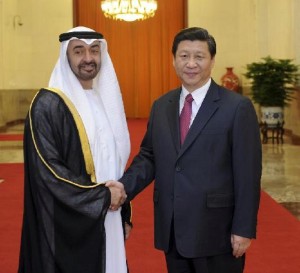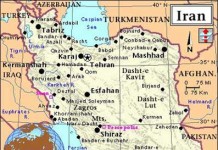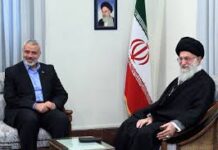
Context
In an endeavor to understand the emerging geopolitical realities, PoliTact partners with leading thought centers to understand the longitudinal multi-faceted tangents of a particular theme. One such topic is the political, security, and economic interconnections between South Asia and the Gulf States, and one of the subsets, Pakistan and Gulf Cooperation Council (GCC). This relationship has taken on added significance in the context of ongoing great power rivalry and China’s wider engagement with the Middle East, which resulted in the Saudi-Iran détente in March.
This article presents a summary of three events held to date, especially the most recent one that took place on May 22.
US Presence in Afghanistan
The first event to cover this theme was held on November 16, 2018 in collaboration with the Middle East Institute. With US still present in Afghanistan, obviously influenced the perspectives, but it was clear this interrelationship would become more pronounced in the future. The GCC nations, especially Qatar, was facilitating the peace talks between the Afghan Taliban and the US, which later led to the Doha Agreement in February 2021.
One of the other significant trends was the continuing Indian economic encroachment of GCC, from where Pakistan has traditionally drawn support. One of the Panelist, former director for Pakistan and Afghanistan at the White House’s National Security Council, Shamila Chaudhary, had commented then:
“Pakistan does need to pay attention to the growing nexus between India and the Gulf States, especially when its transitioning from purely economic and into security and defense domains.
China-Iran Economic Deal and Abraham Accords
On July 28, 2020, PoliTact held a webinar to discuss the potential China-Iran $400 billion economic deal and its impact on the China-Pakistan Economic Corridor (CPEC). China-Iran defense cooperation has been growing in the aftermath of President Trump’s decision in 2018 to unilaterally withdraw from the Iran nuclear deal reached in 2015 – which was a hallmark achievement of the Obama administration.
Moreover, additional Muslim states, such as UAE, Bahrain, Sudan, and Morocco officially recognizing the state of Israel as a consequence of Abraham Accords, reached during the Trump’s presidency in 2020.
These developments resulted in deepening of the contradictory pressures for Pakistan. On the one hand, the country is China’s closest strategic partner, which was also expanding its ties with Iran. On the other hand, Pakistan’s closest Arab allies, UAE and Saudi Arabia, were moving closer to Israel.
When it comes to the Indian alignment with Israel and its growing ties with the Gulf nations, a question was again assessed about how these relations undercut the traditional support Pakistan has generated from the Gulf region, as referenced above.
Commenting on this during the webinar, panelist and former Editor-in-Chief of Arab News and Saudi Gazette, Khaled Almaeena, stated: “Pakistan’s position has been undermined by the negative economic and security news consistently emanating from the country. And this has been occurring at a time when India has positioned itself as an information technology and economic powerhouse, and by investing in Saudi Arabia that brought jobs to the Kingdom.” He further added, “the younger leadership of KSA do not hold the same kind of affinity towards Pakistan as past leaders had.”
China and Saudi-Iran Detente
PoliTact collaborated with the Middle East Institute again on May 22 to analyze the South Asia and GCC connection in the aftermath of China facilitated Saudi-Iran détente announced in March.
The panel discussion, led by Gerald M. Feierstein, Director of MEI’s Arabian Peninsula Program, assessed Chinese foreign policy within the framework of the Arabian Gulf and South Asia, with a specific emphasis on great power competition. Gerald Feirstein highlighted that much of the attention surrounding the intensifying competition between the US and China has been focused on the Asia-Pacific region. However, China’s growing involvement in the Middle East and South Asia has increasingly become a significant concern for the US.
The panelists were Senior Fellow and Co-Director of the East Asia Program and Director of the China Program at the Stimson Center, Yun Sun; Senior Advisor on South Asia at the United States Institute of Peace, Dr. Daniel Markey; veteran Saudi journalist, Khaled Almaeena; and Syed Muhammad Ali; the South Asia expert Non-Residence Scholar at the Middle East Institute.
The panelists examined several key questions:
- Are China’s objectives in the region primarily driven by economic interests or do they have political and security dimensions as well?
2. How do countries in the wider Middle East perceive their relationships with China?
3. How does the US-India partnership influence China’s regional initiatives and impact Pakistan’s interests in the China-Pakistan Economic Corridor?
4. What is China’s vision and long-term goals in the region?
Chinese Perspective
Yun Sun emphasized that Chinese foreign policy is well structured, viewing the Middle East and South Asia as distinct regions. China’s focus on the Middle East is primarily driven by its reliance on energy imports, with 52 percent of its energy sourced from the region. Beijing has effectively pursued its objectives in the Middle East by employing a diplomatic approach that seeks to balance economic and political engagements with all significant parties, including those in conflict with each other.
It is important to note that China does not see itself as a mediator responsible for the normalization of relations between Saudi Arabia and Iran, and the assumption that China will replace the United States as the primary security provider in the Middle East is premature – but this is an overarching perception.
She pointed out this perception in the Middle East that US will disengage with the region and pivot to Asia does play out well in the long run and needs to be countered. Overtime people will start believing this.
She went on to add, China lacks the necessary political, security, and military engagement in the region. Conversely, China’s interests in South Asia mainly revolve around regional security concerns, particularly counter-terrorism efforts in Afghanistan and Pakistan, as well as maintaining its influence by counterbalancing India at a sub-regional level.
While China aims to preserve a certain level of affinity with India to prevent it from completely aligning with the United States against China’s ambitions, Pakistan plays a crucial role in China’s South Asia regional strategy. There are two notable aspects in China’s foreign policy formulation concerning the Middle East and South Asia.
Firstly, due to its energy requirements, China aspires to establish an energy transportation corridor linking the two regions.
Secondly, China advances its commercial and political goals by considering the shared interests among Muslim-majority countries in the Gulf and South Asia.
The other panelists, Daniel Markey reiterated that China’s interests in the Middle East are primarily driven by energy, while its interests in South Asia are focused on security matters and partially aimed at counterbalancing India.
Markey highlighted that China is gradually displaying an opportunistic willingness to assume an active leadership role, leveraging its economic influence to gain political influence. Additionally, all countries in the Middle East and South Asia have their own unique interests and perceive collaboration with China as a mutual opportunity. This applies not only to India and Pakistan but also to Iran and Saudi Arabia. As different countries engage with China, its prospects for exerting political influence multiply.
Moreover, Daniel acknowledged that China has surpassed the need for relying solely on Pakistan’s support to maintain its favorable relations with the Muslim world.
Pakistan’s Perspective
Syed Muhammad Ali, providing the Pakistani perspective on the country’s increasing dependence on China, emphasized that Pakistan’s relationship with China has predominantly revolved around security concerns. However, Pakistan aims to transform its geo-strategic position from being primarily security-oriented to becoming a geo-economic actor. Despite facing multiple crises such as political instability, terrorism, and economic challenges, Pakistan is actively pursuing engagement with the Chinese Belt and Road Initiative. At the same time, US is the biggest market for Pakistan’s exports and China is never going to replace that.
Moreover, the Saudi-Iran détente provides it with the breathing space – as in the past the tensions between the two have played out in Pakistan. This could result in more focus on the Iran-Pakistan Gas Pipeline.
Syed also pointed out that as the US-India strategic partnership grows, it will increasingly make US unable to play the mediator role between India and Pakistan. This will only increase Pakistan’s insecurity.
Gulf Perspective
Khaled Almaeena presented the perspective of Gulf countries regarding China. He emphasized that in comparison to the West, these nations have overtime come to view China as a reliable economic partner and an impartial political mediator. China has gradually strengthened its diplomatic influence in the Middle East through a methodical and gradual approach.
Daniel Markey noted that the US decoupling from the Middle East, if it is happening, will take time to unfold, especially because of the military dimension. Furthermore, as China engages more with these nations, it may confront the same challenges and sentiments that US has had to deal with.
Uyghur Issue and China
When its comes to the Uyghur issue, Daniel Markey commented that China has skillfully portrayed it as an internal matter related to national security. Furthermore, the significant economic interests shared between Muslim countries and China are of such magnitude that China’s political oppression of the Uyghur population does not jeopardize their relations.
Yun Sun added that although anti-China ethnic movements are gaining momentum in Central Asian countries, however, the involvement of Russia in Ukraine has led these countries to increase their reliance on China. As a result, they are unlikely to pose a potential threat to Chinese security and economic interests soon.
She also noted that in light of the Taliban’s takeover in Afghanistan, China has prioritized its security interests in Central and South Asia, leading to enhanced security cooperation with regional countries. Such as the Quadrilateral Group on Afghanistan which include Pakistan, Iran, and Russia.
China-Russia Relations
Daniel Markey argued that Russia has become a junior partner to China in the region, but countries like India are attempting to maintain a balance between China and Russia based on their own strategic interests – and wedge between the two helps India.
On the other hand, Yun Sun stated that China views Russia as a helpful partner and has benefited from Russia’s involvement in the Middle East, Central Asia, and South Asia. China has found Russia’s strategy of creating chaos indirectly advantageous, providing China with more leverage. However, chaos in Ukraine can become a liability for China.
The discussion concluded by noting that China’s leadership role and influence in the Gulf and Asia regions are growing, with these countries welcoming China more favorably compared to the West, as pointed out by Khaled Almaeena earlier. China has become a significant player in geopolitical bloc politics. At the same time, many Arab nations aspire to become members of SCO. At the same time, Yun Sun stated that it’s not clear what tangible successes the organization has achieved.
Meanwhile United States has also formed alternative regional groupings driven by geopolitics, such as I2U2 and QUAD, but their effectiveness is questionable as well. As Daniel Markey commented, there is a question of rhetoric and reality when it comes to these organizations.
Recommendations for US Policy
Recommendations were made for US policy, with panelists agreeing that the US should not completely disengage or overreact to Chinese influence in a state of anxiety. Instead, the US should adopt a clearer approach to its political, economic, and security interests in the region. Viewing US relations with its partners in the Middle East and Asia within the framework of great power competition with China may negatively impact the US approach and its interests.



